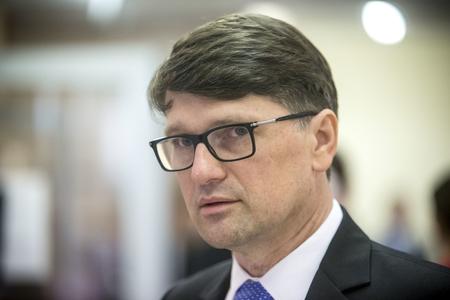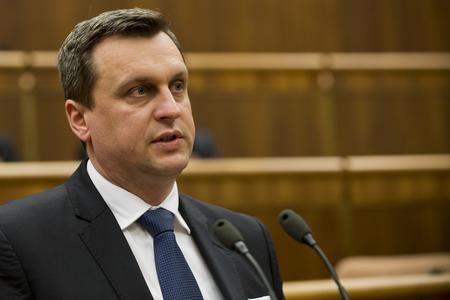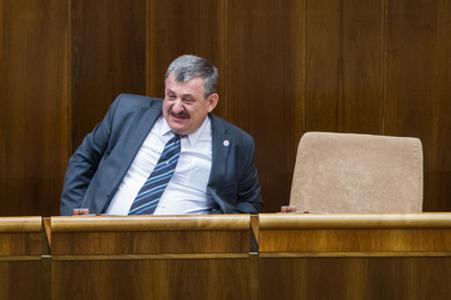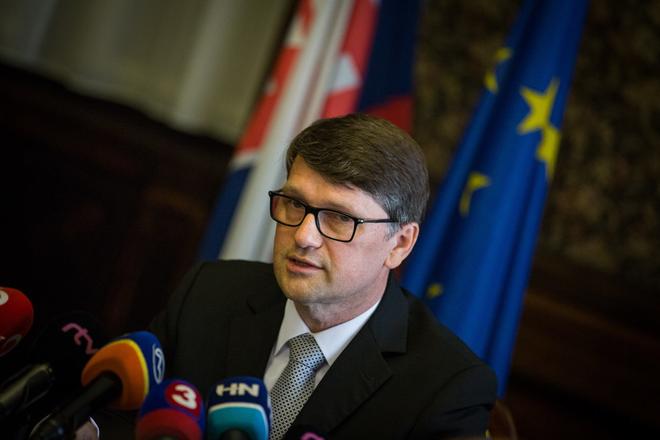The ruling coalition has unexpectedly stumbled upon an issue that did not appear controversial at first: licence fees for public-service media, which are paid by every Slovak household.
The problem began when the Slovak National Party (SNS) on June 1 said they would not support a hike of licence fees for public broadcaster Radio and Television Slovakia (RTVS) as proposed by Smer’s Culture Minister Marek Maďarič. The coalition partners held a meeting where they upheld SNS’ position. Maďarič, who was not present at that meeting, however, remained firm on his position, arguing that the hike in the fees is part of the government’s programme statement. He even threatened with his resignation unless the coalition reconsiders his proposal.
“I’m willing to put my own political fate in this, because I think Slovakia needs this,” Maďarič told the June 6 press conference.

Coalition partners continued saying that no crisis was taking place within the coalition, but after Maďarič said he may just walk out on the government, they agreed to discuss the fees again. On June 7 Prime Minister Robert Fico issued an official statement to the end that the Coalition Council would convene on June 13 to coordinate its approach to the concessionaire fees, “with the minister in charge present [at the talks]”.
“It is peculiar that a member of the cabinet for the majority party is in opposition,” political analyst Grigorij Mesežnikov told The Slovak Spectator and admitted that he would be surprised if Maďarič really stepped down over a thing like licence fees.
The hike proposal
Maďarič and his ministry propose to increase the RTVS licence fees as of January 2017 from the current €4.64 per month to €7. Connected to domestic electricity bills, the fees have to be paid by every Slovak household under the so-called Outlet Act. The sum of the fees has not been subject to change for 13 years, and the current government has pledged to revisit the sum in its programme statement (which also the SNS signed) as part of a legislative effort to provide RTVS with a stable and adequate budget necessary to meet its mission statement.
Now SNS, however, say that they would like to increase the fees later, based on the optimisation of the financing, management and programme structure of the RTVS. SNS chair Andrej Danko said it is necessary that the broadcaster offers certain quality for the increased fees, the TASR newswire reported.

“It’s a political illusion to think that the fees could be hiked in the second half of the electoral term,” ministry spokesman Jozef Bednár responded as quoted by the TASR newswire and noted that bolstering the RTVS budget is among the fundamental priorities for Minister Madarič.
“We might pretend as much as we want that the government’s programme is sacred, but after this precedent nothing is sacred anymore,” Maďarič said as quoted by the TASR newswire.
Maďarič’s position
“Maďarič has sent a strong signal and SNS and Smer will now have to find a compromise,” political analyst Pavol Baboš from the school of political sciences of the Comenius University told The Slovak Spectator.
Mesežnikov also believes Maďarič’s attitude to be an expression of disagreement. He noted that Maďarič has been part of a group closest to PM Fico in Smer, he was the main communication expert of the party, “fully identified with the PM, never leaving any doubts about his loyalty to Fico”.
Maďarič has always been linked with the ideological rather than the business wing of the party, and he reportedly had problems with some activities of people from the business wing, Baboš noted.
“That could explain why Maďarič is not afraid to go into conflict, but it could also suggest that he will not be willing to step back very easily,” Baboš said.
If Maďarič stepped down it probably wouldn’t bring down the ruling coalition, but it would be the first time for Smer to appear as a party not united within, said Mesežnikov.
What crisis?
Despite demission threats, neither Maďarič nor other people from coalition partners were willing to admit the coalition was going through a crisis. Maďarič rather preferred to call it “a practical problem that I perhaps might have medialised in an unfortunate way”, he said on June 8 as quoted by TASR, and stressed that there seems to be interest among the partners to deal with the issue and solve it.
Most-Hid and Siet remained moderate in their statements about the controversy. While Most rather stressed the importance of the programme statement, Sieť did that too but also admitted citizens should get quality for their licence fees.

There have been concerns when the coalition of four diverse parties emerged that they would frequently encounter problems of this kind, yet observers hardly expected that the first bigger conflict would occur between SNS and Smer, Baboš admitted.
“But it’s not a tragedy, it’s natural for coalition governments to have differences and harmonise their positions, perhaps the seemingly peaceful one-party government caused that people are no longer used to it,” Baboš said.
SNS eyeing RTVS?
The position of SNS caused some observers to wonder whether the party might be aiming to get an influential post in the public-service broadcaster. Danko refused such allegations.
“It’s not about any posts or about influence in the media, but about systemic things,” Danko said as quoted by TASR.
Maďarič refused that changes in the RTVS management might be at stake during the coalition council meeting on June 13. He also said that he did not notice anyone voicing ambitions to head the broadcaster after the term of the current general director, Vaclav Mika, is over next summer.
Baboš, however, noted that it is hard to imagine anything else than the RTVS management post that would motivate SNS to go against Maďarič.
“I don’t believe that it’s a coincidence that SNS MP Karol Farkasovsky announced that he could imagine such a challenge, to manage RTVS,” Baboš said.
Radka Minarechová contributed to this report



 Marek Maďaric (source: TASR)
Marek Maďaric (source: TASR)